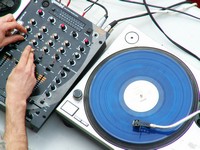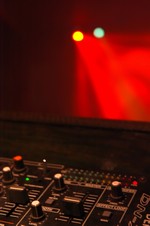
DJ Turntables are used by a DJ, or disc-jockey, to play music for an audience. A DJ, in simple terms is someone who selects and plays music for an audience. Radio announcers are occasionally called DJs, although they rarely actually do the selecting of the music. In the current era, a DJ most commonly refers to someone who plays in a nightclub or some other form of party that involves dancing including house parties or weddings. DJ turntables are an integral part of a DJ’s equipment are used to play the vinyl records.
DJ turntables are used to play vinyl for similar reasons to audiophile turntables – the audio quality is superior. However, DJs may also make use of techniques such as scratching to add extra sounds, therefore DJ turntables can also act as an instrument in its own right. Using DJ turntables in this fashion is an art called Turntablism, and the techniques employed in it are quite different to what is needed for club DJing. Most people that are interested in beginner DJ equipment are looking to get in to the club music scene and start getting some gigs, but have little idea of where to start. There are a number of pieces of equipment that are required to get started DJing.
DJ Turntables
Surprisingly, this is not necessary, but certainly recommended for a beginner. DJ turntables have a key feature: the pitch adjuster, which is also sometimes called a speed adjuster. DJ turntables have a slider that makes the record play faster or slower. This is vital for beatmatching, the most important skill of a club DJ. For seamless transitions between songs that people are used to hearing in clubs and on mixes, the beats per minute (or BPM) most as equal as possible between the two songs at the time of transition. The pitch adjuster is used to facilitate this. More advanced beatmatching involves trying to sync up the first beat of each bar (the ‘1’ or the ‘1234’) so that transitions between songs are more powerful and coordinated. Beatmatching is the most important skill for club DJing and requires some practice to nail down, but once you’ve got it it’s a matter of building on it by trying out some more advanced techniques.
DJ Mixers
A mixer, in simple terms, controls volume. It has two sliders on it, one for each of the DJ turntables. These two sliders are used to volume match the two DJ turntables, since not all records are recorded at equal volume. Volume matching is important for a smooth transition. Mixers have a crossfade slider that allows you to switch between channels by operating one slider only. Once the two records are playing at the same speed (beat matched), the crossfader can gradually adjust the volume so that record 1 becomes quieter and record 2 becomes louder, thereby transitioning to the next song in the set/mix. Additionally, they have equalizers (EQs) for the low/mid/high sounds. Using the equalizers well creates a great sounding mix by reducing or amplifying some more prominent sounds in a transition. For example, with a song with a prominent, catchy bass line you may want to cut out the mids and highs to leave only the bass when transitioning to another song which might only have its high sounds playing, creating an ‘overlapping effect’ of two songs that will sound awesome as the two songs are already playing at the same tempo and volume!

DJ Headphones
Headphones are used to listen to the channel that is about to be played in order to beat match or volume match. The typical DJ pose for this is the single shrugged shoulder ramming one headphone against an ear whilst listening to the playing music with the other ear. This can be hard work in a loud club environment and requires a good quality, loud pair of DJ headphones that you can hear the music through over the chaos around you. Closer ear headphones are a must to drown out the unwanted sound.
DJ Speakers
To play the music you will of course need some speakers that can handle the amazing beats you will be putting out. To start off with, it’s okay to use your current audio system to practise, but you may want to consider investing in some higher quality DJ speakers when you start getting serious!
That’s it!
The most important components are the DJ turntables and the mixer, as without either you cannot start beatmatching! The mixer can be skimped on somewhat, but DJ turntables should be of high quality so do some research on which ones to buy. We hope this article and others have inspired your passion in DJ turntables, since there’s nothing as exciting as finding some new, rare vinyl beats to throw in to your mixes.
